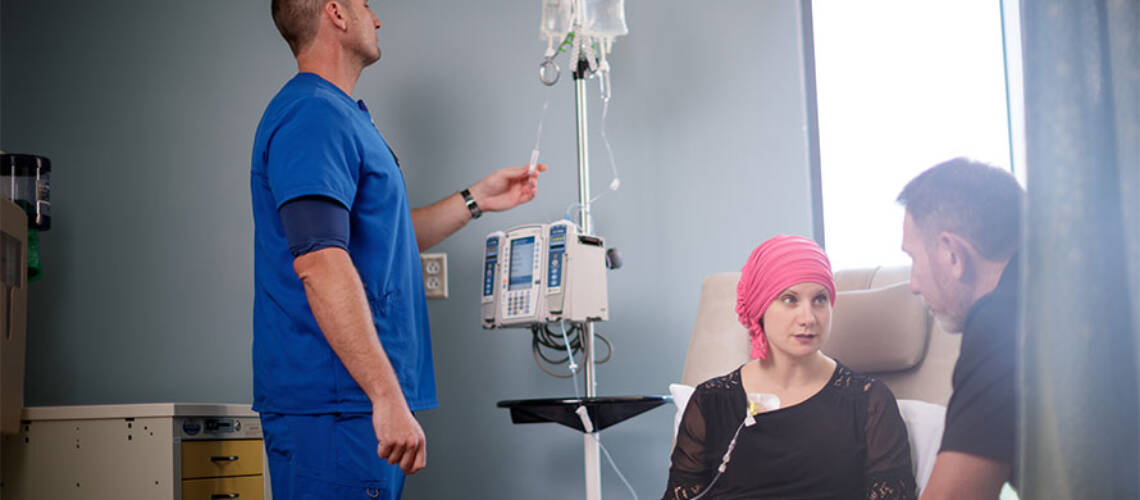Whatever decision you make about where and how to get treatment, you should know, that Cancer treatment is complex. Given the complex nature of malignancy, modern medicine has adopted standards for modern therapy, inclusive radiotherapy, chemotherapy, target therapy, immunotherapy, other biological treatments, operative treatment or a combination of the methods.
Chemotherapy, Targeted and immunotherapy are treatments for malignant tumors with drugs, which kill tumor cells or stop their growth. It is most often administered intravenously or orally. It is less often applied subcutaneously or in the form of patches with a special structure, which pass through the skin into the bloodstream. Chemotherapy is one of the main methods of treatment for all stages of malignant tumors. It can be used before or after surgery, as well as in combination with radiation therapy.
- Chemotherapy (with or without biological therapy) before surgery (neoadjuvant): applied to large tumors, or in tumors, which have special biological characteristics. The goal is to reduce the size, so that the tumor can then be surgically removed. Sometimes it disappears completely. In some even small tumors – e.g. triple-negative breast carcinomas, or HER- the positives, preoperative treatment is mandatory and applied before the operation has a many times better effect and the patient can be cured. Similar is the preoperative treatment for colon cancer in its lowest part, called the rectum, where it goes to an exception operation. Leading there are preoperative treatments, most often a combination of radiation therapy and chemotherapy.
- Chemotherapy after surgery (adjuvant): After surgery for a malignant tumor, in many cases, tumor cells remain in the body. This is why surgery alone cannot cure patients. To eliminate the remaining tumor cells, chemotherapy is administered after surgery.
- Chemotherapy in metastases: when research shows, that there are distractions in the organs, which doctors call metastases, then the goal of chemo- and biological therapy is to remove them or stop their growth.
The mentioned target (aimed) therapy and immunotherapy are biological drugs, for the application of which specific molecular targets must be determined, biological characteristics of the specific tumor, which are previously detected by genetic or histopathological analysis. In this type of treatment, the antitumor drugs pass through the body and attack almost only the tumor cells, who are their carriers. This therapy has different side effects and a narrower specificity than chemotherapy. It is often added to classical chemotherapy.
It is an integral part of drug treatment modern hormonal (endocrine) therapy, which is of great importance in breast cancer and prostate cancer.
Here are some guidelines, if you are starting chemotherapy treatment:
- Ask about side effects, to be prepared, when they appear. The most common side effects with chemotherapy are nausea, vomiting and a decrease in the number of white and red blood cells, and with some drugs, temporary and completely reversible, hair loss occurs. After completing the treatment, the hair is restored in 100%.
- Blood counts are monitored before each infusion. Ask your doctor for advice on how to keep them within normal range. Liver parameters are also monitored.
- Healthy eating is more than important. Take plenty of fluids - water, fresh (no grapefruit), teas.
Important: under no circumstances exclude meat from your diet, milk and milk products or sugars, as this will adversely affect your health!
Especially now, 23 years after reading the genome, clearly showed, that sugars, milk and meat neither stimulate a developed cancer, nor slow him down.
The non-scientific materials, which are found on the Internet, most often in patient forums, very often they give complete misinformation, prohibiting the consumption of sugars, milk and meat. Very often, non-traditional methods for strengthening the body are recommended in such places (drinking one's own urine, taking various nutritional supplements, herbs etc.). Some of these substances are harmless, but their combination with chemo- or biological therapy, it can often make them harmful and dangerous. Be responsible for your health and don't trust everything, that you see online.
Important: Every patient is needed, undergoing antitumor drug treatment, to share with his treating medical oncologist the entire range of drugs, nutritional supplements and herbs, which he accepts or intends to accept, as this may prove critical to treatment.
There are also myths about taking vitamins, which are not only not harmful, but they are perfectly combined with chemotherapy. Before 20 years it was assumed, that B12 stimulates tumor cells. Subsequently, it turned out to be the exact opposite - low levels of vitamin B12 are responsible for the faster development of certain malignant tumors - breast cancer. There are also anti-tumor drugs, which during their application require additional intake of vitamin B12 and other vitamins.
As a summary for vitamins and trace elements can be accepted, that they are even desirable in the treatment of malignant tumors, but those of them, which are registered as medicines, and not as dietary supplements.
The treatment in different patients continues in different time intervals, as the characteristic is, that it is generally cyclical - the so-called are held courses of chemotherapy at fixed intervals, which can be on 7 days,15 days, 21 days, 28 days or others depending on the treatment scheme. Some patients may require a shorter stay in the hospital, while for others this stay is of the order of several days, and even a week. Of course, in case of treatment complications, the exact length of stay cannot be predicted (bedsores) in the hospital.
However, rest does not mean lying down. A good engine mode is recommended – at least 1,5 – 2 km. leisurely walking daily with regular meals and abundant fluid intake. Another common fallacy prohibited patients from entering mineral waters, to undergo massages, to visit a sauna, to conduct physiotherapy, to go to sea or mountain, which should not be restricted at all and is not to the detriment of patients, but on the contrary.
It is important to emphasize, that modern antitumor treatment of patients requires them to be in good general condition, so that chemotherapy can be administered. It is a modern and highly active method of treatment, which:
- it cannot be used in the very advanced stages of the disease;
- not applied in some patients, in which the oncological suffering leads to the need for long-term bed rest or cannot take care of themselves;
- is not held, if there is involvement of diseases of internal organs, the functioning of which is crucial for the administration of chemotherapy - for example, blood formation, kidney and liver functions;
- some serious co-morbidities, acto severe and difficult to control diabetes, cordially- or cerebrovascular disease, various processes of thrombosis in vessels of the body.









